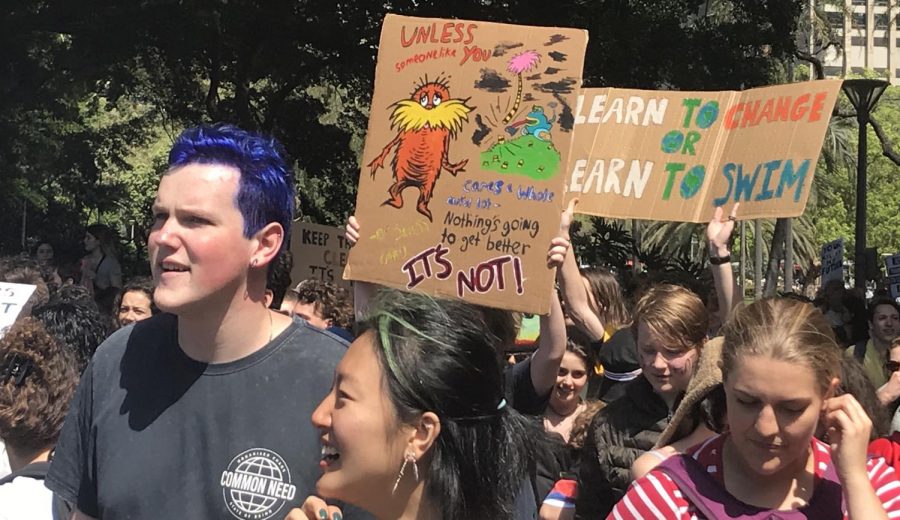‘I’m scared of living in a world without turtles’
“ScoMo, f*ck you! We deserve a future too!” chanted thousands of youth activists as they marched into the Sydney Domain on Friday morning. Students and lecturers from the University of Sydney, UNSW, the University of Notre Dame and UTS walked off the job at 10am to protest climate change.
The crowd demanded a just transition to climate jobs, 100 per cent publicly-owned renewable energy and a total ban on fossil fuels and nuclear power.
“The climate strike is the only way that we can make real change,” said organiser Sof Nicolson. “All other avenues have been exhausted, and… we have 10 years to create change that will allow us to live in a sustainable way.”
The students were joined by thousands more schoolchildren and members of the general public throughout the 45-minute march.

Among them was Nick, 32, a government employee. “We need to take action, and this is action,” he said.
The ABC estimates that tens of thousands of people attended the Sydney protests. This was an increase from the March 2019 strike, which attracted 30,000 participants.
“If we don’t keep the global average warming beneath two degrees, there will be mass droughts and mass floods around the coast of Australia,” said 19-year-old returning participant Keegan.
The University of Sydney’s climate campaign was organised by Spreading the Climate Strike, an independent activist organisation.
Musicians Jack River, Montaigne and Goya performed “love songs for the planet” in solidarity with the student audience.
They were joined by speakers including “Pacific Climate Warrior” Salome Matangi, 11-year-old Indigenous student Marlie Thomas, and Allen Hicks – the National Secretary of the Electrical Trades Union.
Student activists Jean Hinchcliffe and Daisy Jeffrey shared the role of MC.
“The world is literally on fire,” Hinchcliffe said during her opening address. “The Amazon is burning… and with one degree of warming, 200 million people will be displaced. Stop the climate crisis!”
Tommy John-Herbert, who had worked in the seafaring industry on fossil fuel projects for years, told the audience: “Climate justice, workers’ rights! One struggle, one fight! As students, you’ve put climate actions back on the map! If we strike, we have the power to take down their entire system!”
University of Sydney Vice-Chancellor, Michael Spence, endorsed the strike, announcing that neither students nor lecturers would be penalised for participating.
More than 190 classes passed motions in support of the strike, and tutorials were rescheduled to accommodate absent students.
Students and employees from further afield were not so fortunate.
Full-time workers were required to take unpaid leave to attend the strike, which Sofie Nicolson described as “an issue that still hasn’t been resolved”.
Nicolson also complained that casual employees were forced to forego their pay.
As Associate Professor Elaine Huber said, “it depends on leadership. My daughter’s principal is supporti[ve]… but her friend from another school will be suspended if she attends.”
While students have been driving this global movement forward, NSW Education Minister Sarah Mitchell urged parents to prevent their children from attending.
This irony was noted by Dr Penny O’Donnell, a senior lecturer from the Department of Media and Communications at University of Sydney.
“For politicians to intervene in this moralistic way seems completely inappropriate, especially for young children who will be here in the 22nd Century and don’t see our future offering anything,” she said.
Potential punishment did not deter 10-year-old Andrea Villafana
“I’m here today because I’m scared of living in a world without turtles, the Great Barrier Reef and polar bears,” she told the crowd. “Do we really want the world’s biggest coral reef to be wrecked because of old people who like coal?”
In a provocative move, the remaining protesters marched past the NSW Parliament and into Hyde Park following the official demonstration.
Gina Elias, a member of the Socialist Alternative Collective, was similarly dismissive of the liberal government’s policies.
“The climate crisis is a crisis of capitalism,” she said. “It’s a systemic one linked to a society… where profit takes priority over the planet.”










